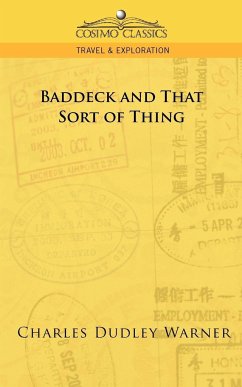
Baddeck and That Sort of Thing
Versandkostenfrei!
Versandfertig in 1-2 Wochen
19,99 €
inkl. MwSt.
Weitere Ausgaben:

PAYBACK Punkte
10 °P sammeln!
We cannot leave Halifax without remarking that it is a city of great private virtue, and that its banks are sound. The appearance of its paper money is not, however, inviting.... I sarcastically called the stuff I received "Confederate money"... -from Baddeck Legend has it that Alexander Graham Bell was inspired by this travelogue of a journey through the Canadian Maritime provinces to establish his estate there. It may be what this delightful little book is best remembered for, but it has much more to recommend it. Originally appearing in five installments in The Atlantic Monthly, from Januar...
We cannot leave Halifax without remarking that it is a city of great private virtue, and that its banks are sound. The appearance of its paper money is not, however, inviting.... I sarcastically called the stuff I received "Confederate money"... -from Baddeck Legend has it that Alexander Graham Bell was inspired by this travelogue of a journey through the Canadian Maritime provinces to establish his estate there. It may be what this delightful little book is best remembered for, but it has much more to recommend it. Originally appearing in five installments in The Atlantic Monthly, from January through May 1874, this journal of a trip through Cape Breton, Nova Scotia, and New Brunswick is quick-witted and unexpectedly smart-alecky, full of observations on the romance of summer travel on a steamboat, the supposed plainness of Canadian women, and the wisdom of a traveler's not revealing that he's from the United States. American essayist and novelist CHARLES DUDLEY WARNER (1829-1900) served on the editorial staffs of the Hartford Press, the Hartford Courant, and Harpers Magazine. He was the first president of the National Institute of Arts and Letters, and published numerous books, including My Summer in a Garden (1870), My Winter on the Nile (1876), and a biography of Washington Irving (1881).














